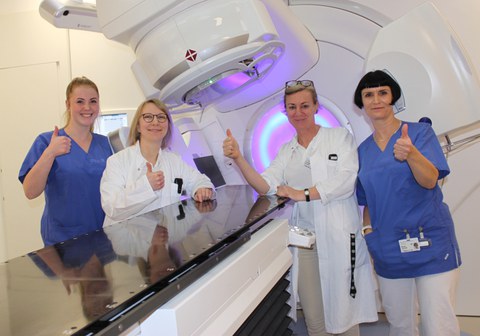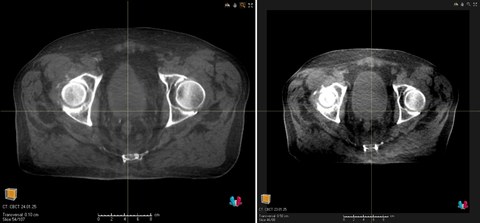Feb 10, 2025
Radiotherapy uses AI-supported imaging solution with Versa HD for the first time worldwide

The team at the Clinic and Polyclinic for Radiotherapy after the first procedure with the new high-resolution AI-supported imaging solution Iris.
The Clinic and Polyclinic for Radiotherapy and Radiation Oncology at the Carl Gustav Carus University Hospital in Dresden is the first facility in the world to treat patients on the Versa HD Linac from Elekta with the new high-resolution AI-supported imaging solution Iris. This enables physicians to visualize target volumes and critical structures for each fraction with even better and more detailed images. The first patient was treated with this innovative procedure at the end of January.
"We have noticed a significant improvement in image quality, which simplifies the image-guided adjustment of patients and improves the quality of radiotherapy," says Prof. Esther Troost, radiation oncologist and Director of the Clinic and Polyclinic for Radiotherapy and Radiation Oncology. "Dresden University Medicine is constantly setting new standards in oncology. The close cooperation between research and patient care in collaboration with industry enables us to constantly improve diagnostics and therapy," says Prof. Uwe Platzbecker, Medical Director at Dresden University Hospital.

Querschnitt im Bereich des Beckens. Mit der neuen KI-gestützten Bildgebungslösung Iris (l.) erhält man eine deutlich verbesserte Bildqualität als mit dem herkömmlichen CBCT (r).
Iris provides the radiotherapy team with high-resolution, AI-supported imaging, radically improved contrast for visualizing the target boundaries and adjacent healthy tissue. This is important in order to accurately determine the radiation dose and irradiate the diseased tissue as precisely as possible. Side effects and risks to the surrounding tissue can thus be minimized.
"This new technique offers a prerequisite for reducing the side effects of radiotherapy when intensive treatment regimens are applied," adds Prof. Mechthild Krause, Director of the Department of Radiotherapy and Radiation Oncology and the OncoRay - National Center for Radiation Research in Oncology, a research center of the Carl Gustav Carus Faculty of Medicine of the TU Dresden and the Helmholtz-Zentrum Dresden-Rossendorf. "We are delighted that Iris will enable us to extend personalized treatment options to more patients and clinics," says the Elekta project manager. "The technology upgrade, which significantly improves image quality, can be installed easily and with minimal disruption, as the team at the Carl Gustav Carus University Hospital has proven." "We are very honored to be the first clinic in the world to use this innovative imaging solution on a Versa HD and look forward to further collaboration," says Stefan Pieck, Administrative Director of OncoRay.
Cancer research for the benefit of patients
The vision of the Dresden OncoRay - National Centre for Radiation Research in Oncology is to significantly improve the cure of cancer through biologically individualized, technologically optimal radiotherapy. Cancer is the second most common cause of death in all developed industrialized nations. In Germany alone, more than 480,000 people are diagnosed with cancer every year. 220,000 people die from it. It can be assumed that malignant tumors will replace cardiovascular diseases within the next 10 to 15 years and become the most common cause of death.
Radiotherapy is a highly effective method of destroying the primary tumor and thus also reduces the risk of metastases spreading, which are usually the final stage of cancer. In contrast to other procedures, radiotherapy can be precisely controlled not only in terms of time but also in terms of space. There is no prospect of radiotherapy being replaced by other methods. On the contrary, in the coming decades, the efficiency and importance of radiotherapy will continue to increase as a result of the physical and technological development of high-precision radiation procedures and the integration of modern elements of biological research, which allow treatment to be tailored to the individual patient. This requires the close transdisciplinary integration of state-of-the-art biology, physics and medicine.
OncoRay's focus and strategy address the great need for preclinical and clinical translational research in this field of research. OncoRay's ambition is to establish itself as one of the world's best centers in this field of research. In order to secure young talent and train urgently needed experts in shortage professions, research at the center is combined with a modular teaching program at the OncoRay Postgraduate School that is measured against international standards.
The center, which began operations in 2005, is jointly supported by the Faculty of Medicine at the TU Dresden, the Helmholtz-Zentrum Dresden-Rossendorf and the Carl Gustav Carus Faculty of Medicine.
www.oncoray.de
Contact:
University Hospital Carl Gustav Carus Dresden
Annechristin Bonß, Press Office
+49 351 / 458 4162
University Hospital Carl Gustav Carus Dresden
Stefan Pieck, Administrative Director OncoRay
+49 351 / 458 5288
